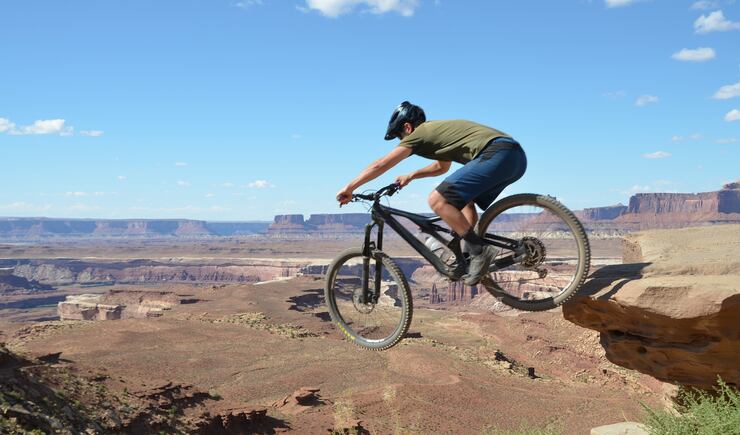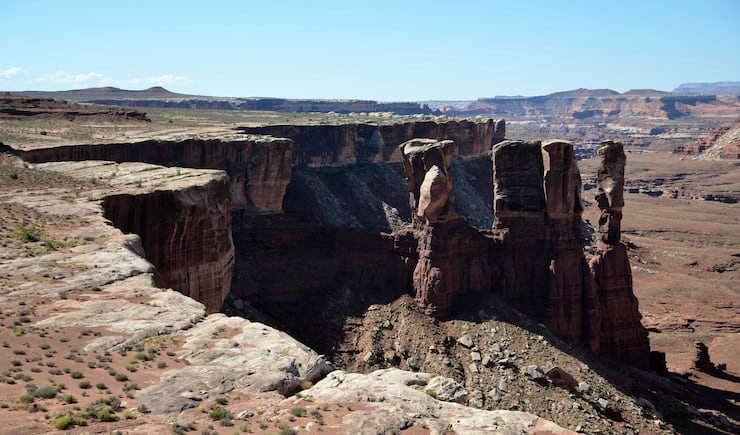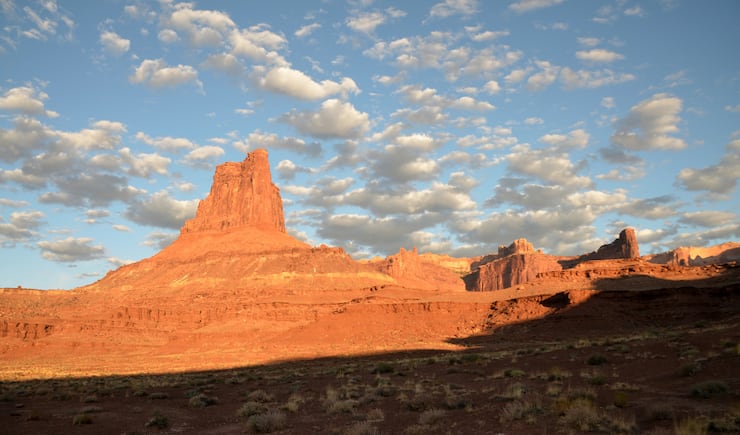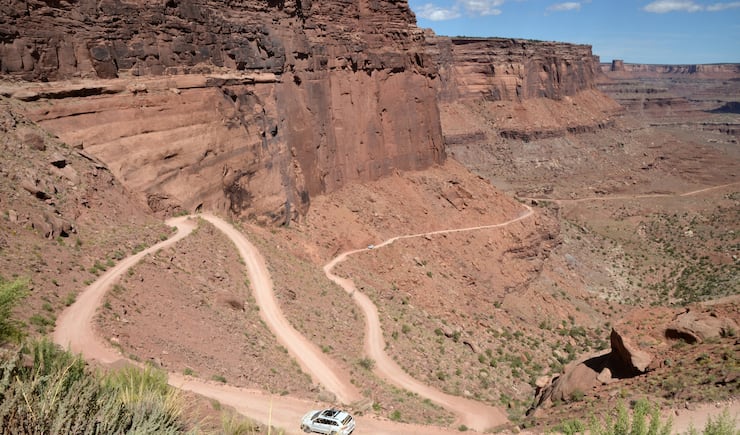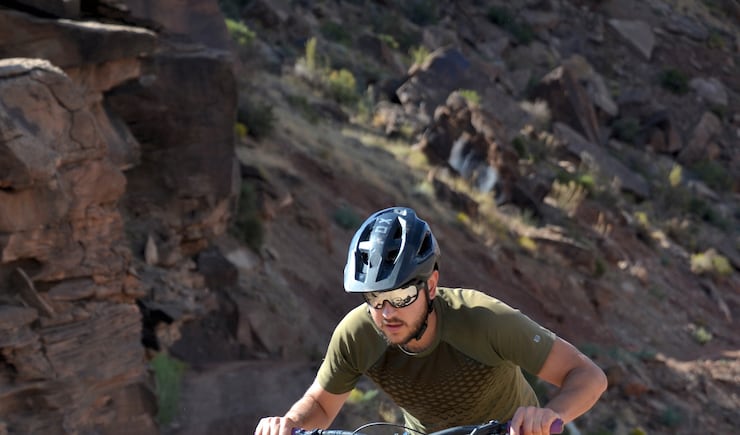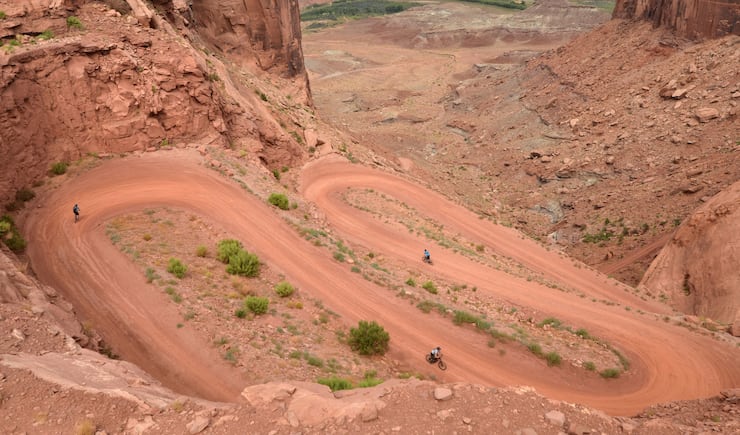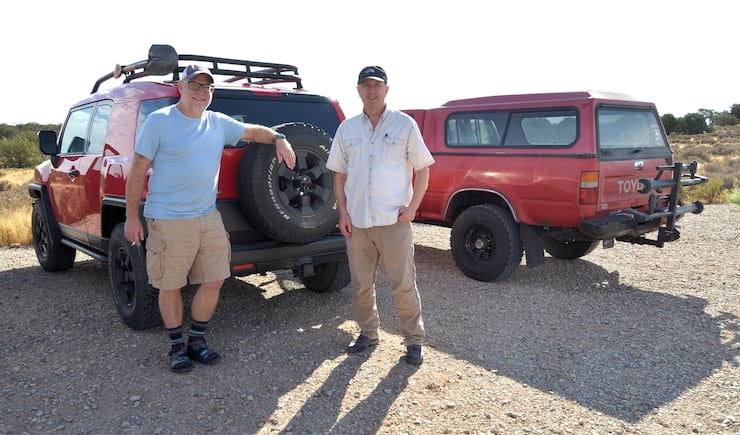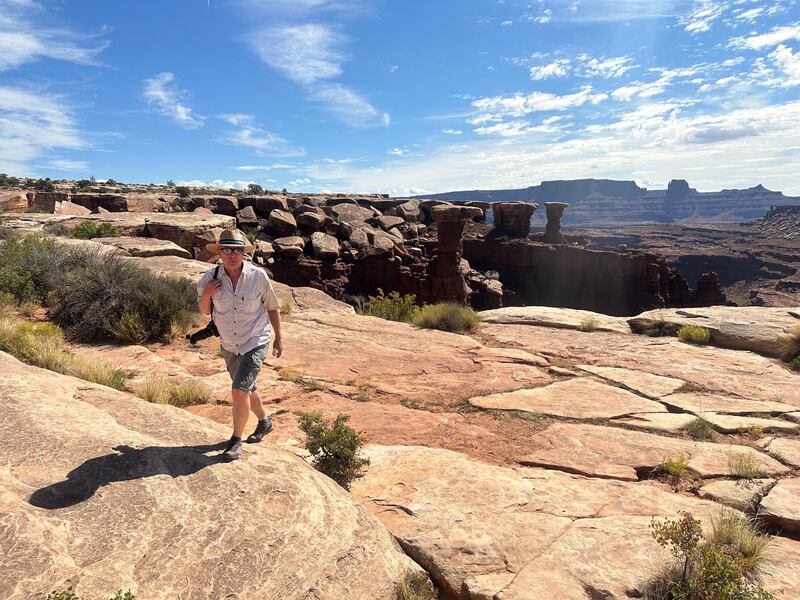I was still wheezing from pushing my bike up the final leg of Hogback, a grueling climb to Murphy’s campground at the beautiful high point of Moab’s iconic White Rim Road.
My dad was grinning after expertly crawling up Hogback with his bright red Toyota FJ, which carried much of our camp essentials. If it wasn’t for Dad and his some 40 years of experience mountain biking, camping and off-roading in southern Utah’s harsh deserts, we wouldn’t be there.
Yet there we were, powering through to the midpoint of our four-day, 90-mile journey, deep into one of Moab’s most infamous and coveted trails in Canyonlands National Park. White Rim punishes its visitors with miles of dry, shadeless stretches and steep, seemingly endless technical roads. But it also rewards with spectacular, untouched canyon views as it winds around and below the Island in the Sky mesa. It offers miles of solitude thanks to its permit requirements, and, well, bragging rights for anyone brave and capable enough to survive the full loop.
Some do it with four-wheel drive. Others pedal it. My dad has done both.
“This,” Dad told me as we looked out across the vast desert from the top of Murphy Hogback, “is my favorite place.”
We watched as the rest of our crew — my husband, my twin sister and brother-in-law, and my dad’s close friend Mark Reece, who drove our other support vehicle carrying the rest of our gear and some 35 gallons of water — pedaled up Hogback. I would say it was the trip’s most grueling of grinds, but that would actually come on day four.
My dad kept smiling as he pulled out his camera to document the leg. Gary McKellar was a photojournalist for 20 years at the Deseret News, and some things just don’t change. Except now, he takes pictures for fun.
“You have no idea how happy it makes me that we’re all here doing this,” he told me.
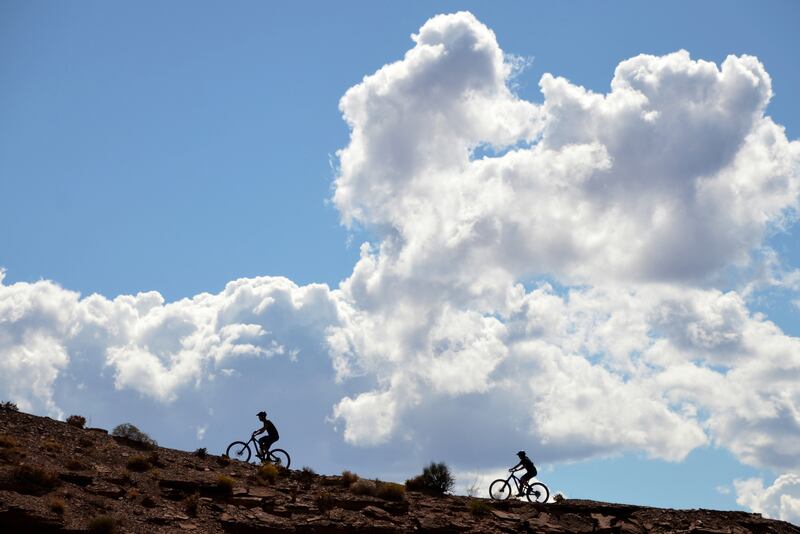
Those words would echo in my head the rest of our trip, whether I was straining up a steep, hot climb or cruising down a fast, flowy stretch of slick rock. They’d especially resonate when I’d stare up at the glowing Milky Way from our campsites, two of which spoiled us with Level 0 dark skies.
At times when I’d pedal ahead of the group, those words would bring me to tears, which would mingle with the sweat dripping from my nose.
My dad doesn’t talk about his feelings much. He’s quiet and steady and strong. I always felt safe with him as a kid, whether we were hunkering down in a scary Lake Powell storm or driving through a blizzard.
But there, at White Rim, I could feel something shift in him. He still didn’t say much, but when he did, I could feel sentiment saturating his words. The love he has for this place is deep, a love that can only come from decades of navigating these vistas through good and bad — from brutal wind storms to flash flooding — with great company.
Almost every year for as long as I can remember, my dad and his buddies would venture out on their annual “Desert Hell” trip, which took place in a remote stretch of desert near Moab separate from White Rim, but where they would battle similar elements. I’m assuming they named it that because of the desert’s severity, but the way they’d talk about it, it should really be named “Desert Heaven.” Just a bunch of friends, their trucks, tents and beer. My dad loves these trips. I can tell they forged deep bonds and unbreakable friendships.
But this year, “Desert Hell” didn’t happen. One of Dad’s desert buddies passed away recently. His death followed another friend’s passing almost 10 years ago, but his absence is still raw.
The pain from those losses seemed to tug at Dad and Mark each night of our trip. On our third night at the Airport campground — where a “Close Encounters”-like vista towered next to us — Dad played recordings of two campfire songs their late friend sang while strumming his guitar. His lyrics captured the humor and joy of the “Desert Hell” trips, from bare bums to sipping bourbon. When the songs concluded, Dad poured out two shots of bourbon for their friends, emptying the flask into the sand.
One night earlier, under the stars at Murphy’s campground, my dad and Mark played “Casimir Pulaski Day,” a beautiful but sorrowful song written by one of my dad’s favorite artists, Sufjan Stevens. The lyrics capture memories of a childhood friend who died after she lost her battle with “cancer of the bone” on the holiday observed in Illinois. I know the words from my childhood, but when I tried to sing along, my throat tightened and tears welled up in my eyes.
It was dark, and seemed like a deeply personal moment, so I resisted looking over at my dad, but I could feel the lyrics — centered on the pain of loss — consuming him and Mark.
“And He takes and He takes and He takes,” the song concluded before it faded into silence. It was just us and the stars. No one spoke for a beat.
Then Dad said softly: “It’s all you have in the end. The memories.”
My dad is 58. My twin sister and I just turned 30. Time has generally been kind to us, but as we get older we feel its unforgiving effects, whether that be in our bodies or the loss of friends and family. For my sister and me, this part of our life is only beginning. For my dad, it’s far more familiar.
Maybe this is why my dad loves White Rim so much. Not just because of his “Desert Hell” memories, but because it’s a constant. When I asked him about our trip and what it would be like — would we run into unexpected conditions or obstacles, given it’s been some 10 years since he’d been here — my dad gave me one answer:
“Trust me,” he said with a chuckle. “This place does not change.”

He was right. The trail was almost exactly as he remembered it. And that’s comforting.
In a rapidly changing world and all the lives it will claim over the years, it’s beautiful to know a place that’s been essentially the same for a millennium. Just look at canyons and hoodoos, carved by wind and water. Just look at the stars. Change takes much longer here.
While hammering our last 20 miles, I found comfort in that thought too. It helped me reason through some frustration and sorrow I found myself wallowing in at some points during our ride. To many, it probably sounds ridiculous to hear a millennial lament the loss of time, but it’s a feeling that’s sharpened for me in recent years.
I haven’t always enjoyed doing the same things my dad has, like mountain biking. That passion didn’t come until I met my husband, who reminded me after I spent the early part of my 20s forgetting how much the outdoors feeds my soul and how it’s good for your body and mind to suffer a little bit while summiting a mountain.
How many years did I miss out on doing things like White Rim with my dad? Maybe that’s negative and unnecessary thinking, because what matters is we’re here now.
That thought is maybe what got me through our final day, which was an absolute suffer fest. And yet somehow I enjoyed every minute of it. That’s saying quite a lot, because I’m generally someone who’s much more fond of fast descents than 90 miles of cross-country with some 6,500 feet of elevation gain.
Dad knows this — that sometimes I get lost in my competitive nature and cravings for speed, and I end up rushing through experiences — so he urged me several times to remember to take in the views. I ended up stopping more often than I otherwise would have without Dad’s encouragement, but occasionally I’d find myself getting carried away and forgetting to stop and look around. We were all going at our own pace, so maybe that’s OK. But maybe I’ve also still got more to learn about slowing down.
Even when we started it, we weren’t certain we’d all be able to pedal the last leg. Shafer Trail is the final, infamous, 2,000-foot climb up out of the canyon. Only occasional, slim patches of shade from towering cliffs saved us from the afternoon sun beating down. Surprisingly, my legs still had strength in them and my heart urged me on. I was sweaty and breathless, but my body kept going, and my mind didn’t give up on me either. I raced to keep up with my husband, who led the pack. My sister and her husband hammered up behind us at their own pace.
Dad, in his FJ, and Mark, in my husband’s Ram, brought up the rear, ready to swoop in and save us from ourselves if our legs gave out. But that didn’t happen.
We made it to the top of Shafer’s and capped off the ride with a final grind up a gravel road to the highway.
“Dad,” my sister said with a laugh into her walkie-talkie when she met us there. “We’re done.”
Soon after, Dad rolled up with his toothy smile.
“Wow,” he said. “You made it.”
It’s a memory I’ll cherish forever.
